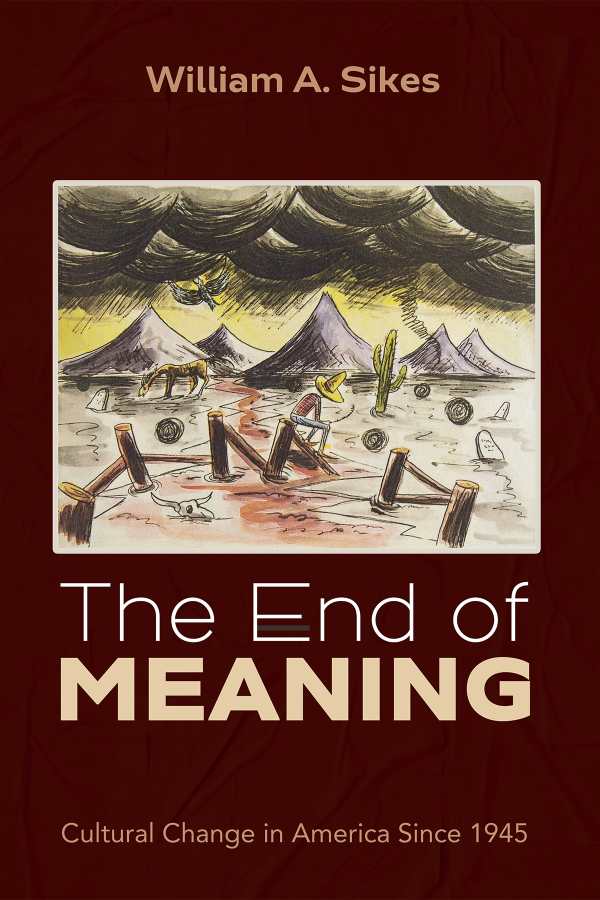The End of Meaning
Cultural Change in America Since 1945
The End of Meaning is a sweeping, somber philosophy text that describes a bevy of cultural losses and bemoans the fragility of social conditions for meaning.
William A. Sikes’s cultural history book The End of Meaning is about postwar America’s evolving relationship with meaning, examined through the lenses of philosophy, religion, art, politics, and everyday life.z
Stating that cultural shifts since 1945 left the US in spiritual and existential disrepair, this ambitious project asserts that American culture relinquished cultivated shared sources of meaning as found in family and community life, education, work, civil religion, and national unity in favor of individualism, consumerism, and technological distraction. Its five parts move from philosophical abstractions to more tangible, embodied experiences, crafting a cumulative critique of cultural disintegration.
Arguing that meaning is rooted in sensory and social experiences, the book says that family, labor, death, religion, war, politics, and sports once functioned as stable, meaning-producing structures before coming under pressure from sociopolitical shifts, secularization, and economic upheaval, privatizing and destabilizing meaning. Now, though meaning is transmitted, internalized, and imagined through cultural media, the book claims that these forms have been diminished by their adherence to commercial imperatives, which it claims crowd out mythic and enduring forms of storytelling.
The text references philosophers including Søren Kierkegaard, psychologists including Carl Jung, sociologists, artists, and religious thinkers to support its claims. Detailed ethnographic accounts of Pueblo religious life and nods to the work of twentieth-century cultural critics including Harold Bloom, Neil Postman, and Robert Putnam are also included. While these citations ground the book’s arguments in a wider intellectual tradition, some of the related analyses are underdeveloped. Further, the prose is dense, impeding the book’s delivery. Long, recursive sentences, extended historical examples, and a rhetorical tone that shifts between philosophical and elegiac slow the book’s progression and clarity.
Still, the breadth of the book’s cultural diagnosis is compelling. It draws connections across disciplines and historical periods well, tracing the gradual hollowing out of shared values and frameworks of meaning. However, its constructive vision is less persuasive. Its gestures toward “reclaiming life” are abstract, and its alternatives are insubstantial. Instead of solutions, it works toward an ending that meditates on the consequences of lost meaning and the potential for renewal, reflecting on cultural fragmentation and invoking Martin Luther King Jr. as a rare exemplar of moral and symbolic coherence.
A work of extended cultural criticism, The End of Meaning outlines an intellectual and cultural history of meaning’s decline.
Reviewed by
pine breaks
Disclosure: This article is not an endorsement, but a review. The publisher of this book provided free copies of the book and paid a small fee to have their book reviewed by a professional reviewer. Foreword Reviews and Clarion Reviews make no guarantee that the publisher will receive a positive review. Foreword Magazine, Inc. is disclosing this in accordance with the Federal Trade Commission’s 16 CFR, Part 255.

